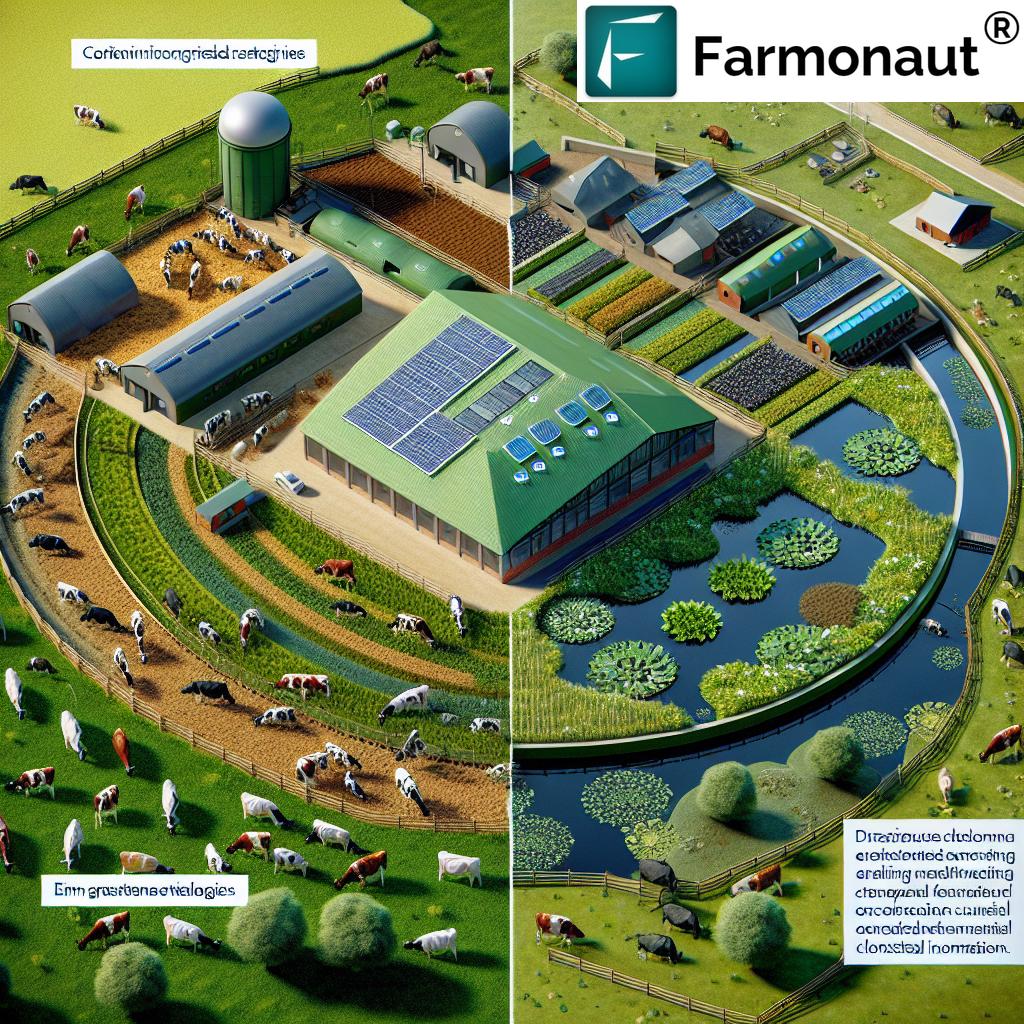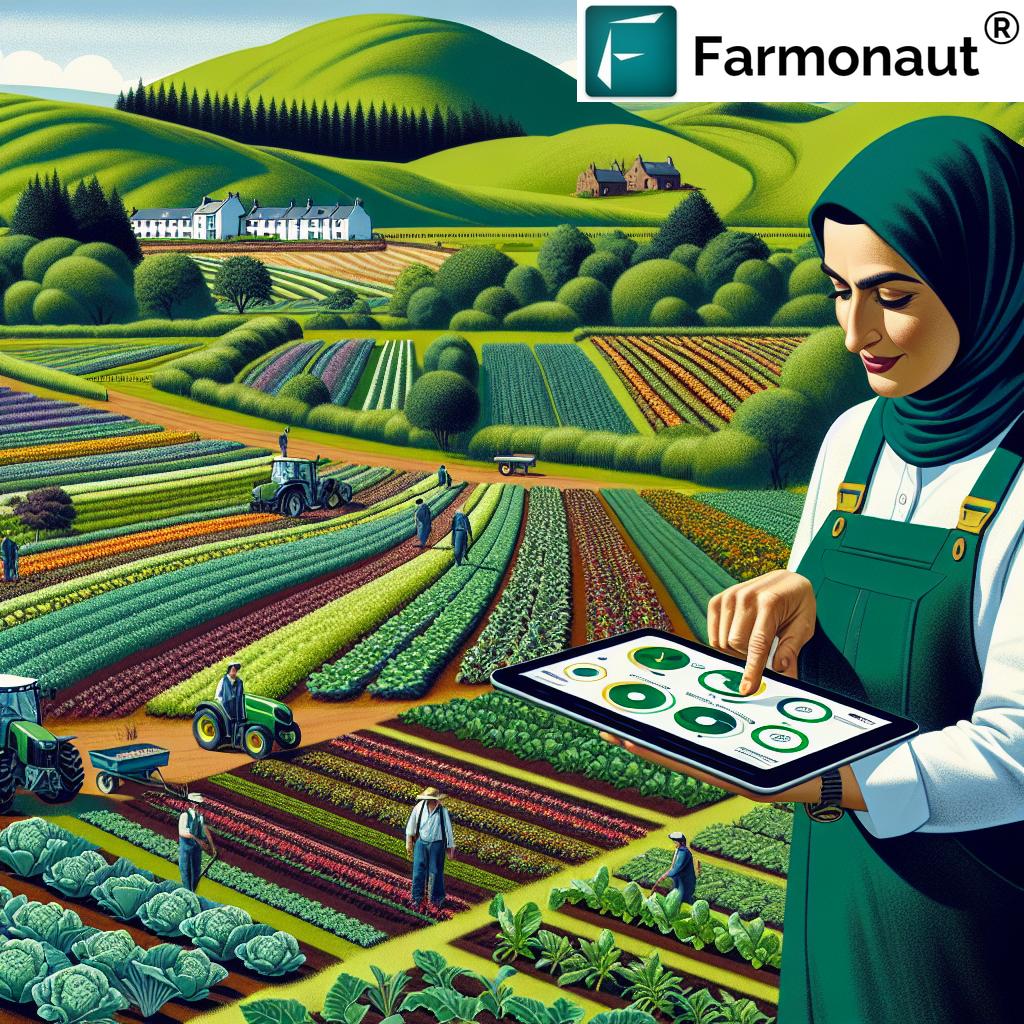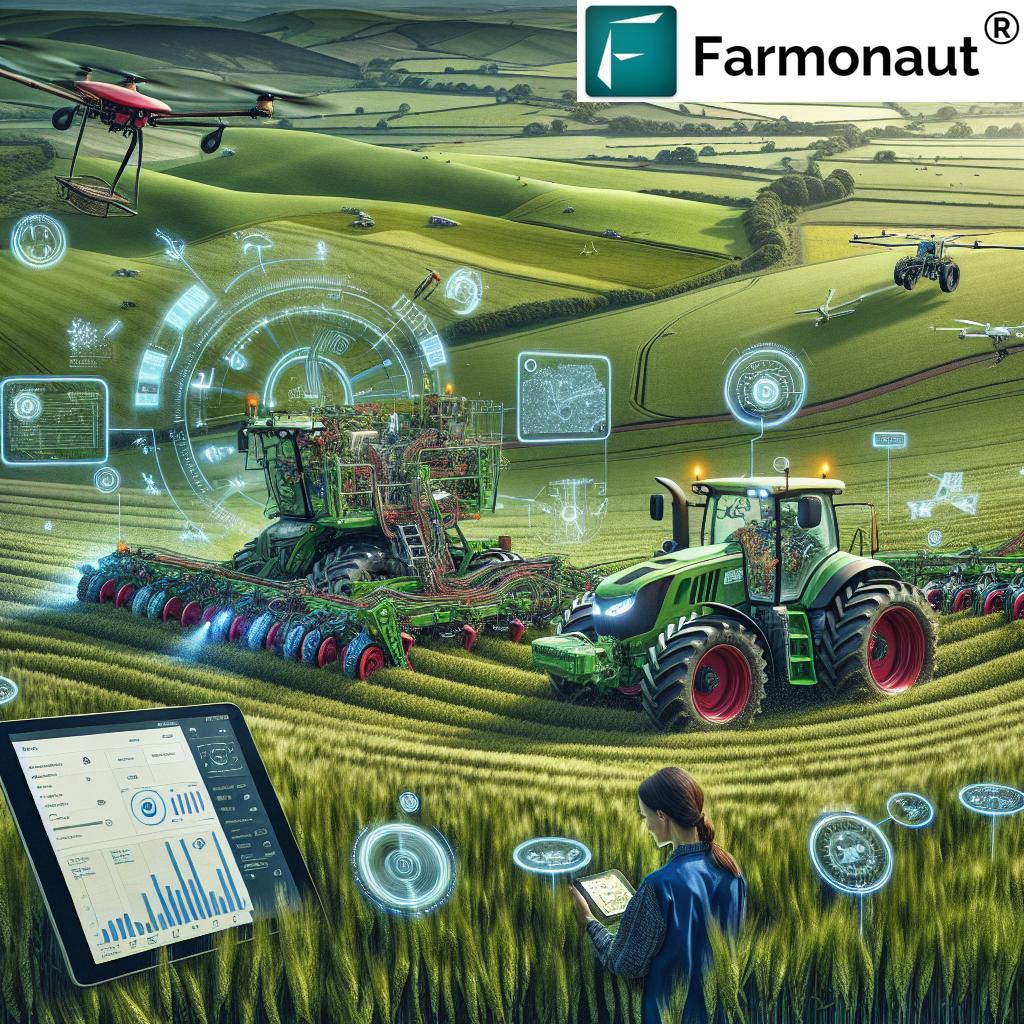Revolutionizing UK Dairy Farming: Farmonaut’s Data-Driven Solution for Boosting Milk Production and Farm Profitability
“GB milk deliveries reached a seven-year low in the 2023/24 season, signaling significant challenges for the UK dairy industry.”
In the ever-evolving landscape of UK agriculture, the dairy sector finds itself at a critical juncture. As we delve into the intricacies of milk production trends and agricultural market analysis, it becomes evident that the industry faces significant challenges. However, with these challenges come opportunities for innovation and growth. In this comprehensive exploration, we’ll examine the factors influencing GB milk deliveries forecast, dairy farm profitability, and the potential solutions offered by cutting-edge agritech platforms like Farmonaut.
The Current State of UK Dairy Farming
The UK dairy industry has long been a cornerstone of British agriculture, providing essential products to millions of households while supporting rural economies. However, recent data paints a concerning picture. The 2023/24 season has witnessed GB milk deliveries hitting a seven-year low, a statistic that has sent ripples through the entire agricultural sector.

This decline in milk production is not merely a statistical anomaly but a reflection of deeper, systemic issues facing dairy farmers across the country. To understand the full scope of the situation, let’s break down the key factors influencing this downturn:
- Economic Pressures: Rising costs of feed, fuel, and fertiliser have squeezed profit margins for many dairy farms.
- Weather Impacts: Unpredictable weather patterns, including extreme events, have affected grazing quality and overall farm productivity.
- Market Volatility: Fluctuations in milk prices and changing consumer preferences have created uncertainty in the market.
- Regulatory Changes: Post-Brexit adjustments in agricultural policies and trade agreements have introduced new challenges for UK dairy farmers.
These factors collectively contribute to the complex tapestry of challenges facing the UK dairy industry. However, to truly grasp the magnitude of the situation, we need to examine the data more closely.
Analyzing GB Milk Deliveries Forecast
The GB milk deliveries forecast serves as a crucial indicator of the industry’s health and future trajectory. Recent data reveals a concerning trend:
| Metric | Current Value (2023/24) | Year-over-Year Change (%) | 5-Year Average |
|---|---|---|---|
| GB Milk Deliveries (million litres) | 14,500 | -3.5% | 15,200 |
| Average Milk Yield per Cow (litres/year) | 7,800 | -2.1% | 8,100 |
| Number of Dairy Farms | 11,500 | -4.2% | 12,200 |
| Average Farm Profitability (£/year) | 45,000 | -8.5% | 52,000 |
| Weather Impact Index (scale 1-10) | 7.5 | +15.4% | 6.2 |
| Economic Pressure Index (scale 1-10) | 8.2 | +10.8% | 7.1 |
This table provides a stark illustration of the challenges facing the UK dairy industry. The decline in milk deliveries, coupled with a decrease in the number of dairy farms, points to a sector under significant strain. The drop in average farm profitability is particularly concerning, as it threatens the long-term sustainability of many dairy operations.
Factors Affecting Milk Yield per Cow
“Weather impacts and economic pressures are key factors affecting milk yield per cow in the UK dairy sector.”
Understanding the factors that influence milk yield per cow is crucial for developing strategies to boost production and profitability. Let’s examine these factors in detail:
- Feed Quality and Availability: The nutritional content of feed directly impacts milk production. Drought conditions or poor harvests can lead to reduced feed quality and quantity.
- Herd Health: Disease outbreaks or inadequate veterinary care can significantly reduce milk yield.
- Genetic Improvement: Breeding programs aimed at enhancing milk production traits can increase yield over time.
- Farm Management Practices: Efficient milking routines, proper housing, and stress reduction techniques all contribute to optimal milk production.
- Seasonal Variations: Milk production naturally fluctuates throughout the year, with peaks typically occurring in spring and early summer.
By addressing these factors through innovative solutions and data-driven approaches, dairy farmers can work towards improving their yield and overall farm efficiency.
The Role of Agritech in Revolutionizing Dairy Farming
In the face of these challenges, the UK dairy industry is turning to technological solutions to enhance productivity and sustainability. Agritech platforms like Farmonaut are at the forefront of this revolution, offering data-driven insights that can transform farm management practices.
Farmonaut’s satellite-based crop health monitoring system provides real-time data on pasture conditions, allowing dairy farmers to optimize grazing patterns and feed management. This technology can be particularly valuable in the context of weather impacts on dairy farming, as it enables farmers to make informed decisions based on up-to-date environmental data.
Key Features of Farmonaut’s Solution for Dairy Farms:
- Real-time pasture health monitoring
- AI-driven advisory system for optimal farm management
- Weather forecasting and impact analysis
- Resource management tools for improved efficiency
- Carbon footprint tracking for sustainable farming practices
By leveraging these tools, dairy farmers can address many of the challenges highlighted in our earlier analysis. For instance, the ability to monitor pasture health in real-time can help mitigate the impact of adverse weather conditions on feed quality, potentially improving milk yield per cow.

To access Farmonaut’s innovative solutions, dairy farmers can choose from various platforms:



Sustainable Dairy Farming Practices
As the industry grapples with economic and environmental challenges, the adoption of sustainable dairy farming practices becomes increasingly crucial. These practices not only help in reducing the environmental impact of dairy operations but can also contribute to improved farm profitability in the long run.
Some key sustainable practices that UK dairy farms can implement include:
- Precision Nutrient Management: Using data-driven approaches to optimize fertilizer application, reducing waste and environmental impact.
- Water Conservation: Implementing efficient irrigation systems and water recycling techniques.
- Renewable Energy Adoption: Investing in solar or wind power to reduce energy costs and carbon footprint.
- Improved Waste Management: Utilizing anaerobic digesters to convert manure into biogas and fertilizer.
- Carbon Sequestration: Implementing practices that increase soil carbon storage, such as rotational grazing and cover cropping.
Farmonaut’s platform can play a crucial role in implementing these sustainable practices by providing farmers with the data and insights needed to make informed decisions. For example, the carbon footprint tracking feature can help farmers monitor and reduce their greenhouse gas emissions, aligning with broader industry goals for sustainability.
The Future of UK Dairy: Challenges and Opportunities
As we look towards the future of the UK dairy industry, it’s clear that both challenges and opportunities lie ahead. The sector must navigate a complex landscape of economic pressures, changing consumer preferences, and environmental concerns. However, with the right strategies and technological solutions, there is potential for significant growth and innovation.
Key Areas of Focus for the Future:
- Technology Adoption: Embracing agritech solutions like Farmonaut to enhance farm efficiency and productivity.
- Diversification: Exploring value-added products and alternative revenue streams to boost farm income.
- Sustainability: Implementing environmentally friendly practices to meet consumer demands and regulatory requirements.
- Skills Development: Investing in training and education to equip farmers with the skills needed for modern dairy farming.
- Market Expansion: Exploring new export opportunities and niche markets for UK dairy products.
By focusing on these areas, the UK dairy industry can work towards overcoming its current challenges and building a more resilient and profitable future.
Leveraging Data for Informed Decision-Making
One of the most powerful tools available to modern dairy farmers is data. By harnessing the power of agricultural data insights, farmers can make more informed decisions about every aspect of their operations. Farmonaut’s platform excels in this area, providing farmers with a wealth of actionable data.
For example, Farmonaut’s yield forecasting tools can help farmers anticipate production levels and plan accordingly. This can be particularly valuable in managing supply and demand dynamics, ensuring that farms are producing efficiently to meet market needs without overextending resources.
Key Benefits of Data-Driven Farming:
- Improved resource allocation
- Enhanced risk management
- Optimized breeding and herd management
- More accurate financial planning and budgeting
- Better alignment with market demands
By embracing these data-driven approaches, UK dairy farms can position themselves for success in an increasingly competitive global market.
The Role of Government and Industry Bodies
While individual farms play a crucial role in shaping the future of the UK dairy industry, support from government and industry bodies is equally important. Policies and initiatives that promote sustainable farming practices, invest in rural infrastructure, and support technological adoption can have a significant impact on the sector’s overall health.
Key Areas for Policy Support:
- Research and development funding for agritech innovations
- Grants and subsidies for sustainable farming practices
- Trade agreements that support UK dairy exports
- Education and training programs for farmers and agricultural workers
- Regulatory frameworks that promote fair pricing and market stability
By working in collaboration with these bodies, companies like Farmonaut can help ensure that their solutions are aligned with broader industry goals and regulatory requirements.
Conclusion: A Data-Driven Future for UK Dairy
As we’ve explored throughout this analysis, the UK dairy industry faces significant challenges, from declining milk deliveries to economic pressures and environmental concerns. However, the path forward is clear: by embracing innovative technologies, sustainable practices, and data-driven decision-making, the sector can overcome these obstacles and thrive in the years to come.
Farmonaut’s comprehensive suite of tools offers a powerful solution for dairy farmers looking to enhance their operations. From real-time crop monitoring to AI-driven advisory systems, these technologies can help farms boost productivity, reduce costs, and operate more sustainably.
As we look to the future, it’s clear that the most successful dairy farms will be those that adapt to changing conditions, leverage cutting-edge technology, and prioritize sustainability. By doing so, they can ensure not only their own profitability but also the long-term viability of the UK dairy industry as a whole.
For those ready to take the next step in revolutionizing their dairy operations, Farmonaut offers a range of subscription options to suit farms of all sizes:
Frequently Asked Questions
Q: How can Farmonaut help improve milk yield per cow?
A: Farmonaut’s satellite-based crop monitoring can help optimize pasture management, ensuring cows have access to high-quality grazing. Additionally, the AI advisory system can provide insights on feed management and herd health, potentially leading to improved milk yields.
Q: Is Farmonaut suitable for small dairy farms?
A: Yes, Farmonaut offers scalable solutions that can benefit dairy farms of all sizes. The platform is designed to be user-friendly and cost-effective, making it accessible to small and medium-sized operations.
Q: How does Farmonaut’s technology help with weather impact management?
A: Farmonaut provides real-time weather data and forecasts, allowing farmers to make proactive decisions about grazing, feeding, and other farm management practices. This can help mitigate the impact of adverse weather conditions on milk production.
Q: Can Farmonaut integrate with other farm management systems?
A: Yes, Farmonaut offers API access, allowing for integration with other farm management tools. For more information, visit our API page or check out our API Developer Docs.
Q: How does Farmonaut support sustainable dairy farming practices?
A: Farmonaut’s platform includes features for carbon footprint tracking and resource management, helping farmers implement and monitor sustainable practices. The data-driven insights provided can also lead to more efficient use of resources, reducing environmental impact.
By embracing these technological solutions and sustainable practices, the UK dairy industry can navigate its current challenges and emerge stronger, more efficient, and better prepared for the future.













